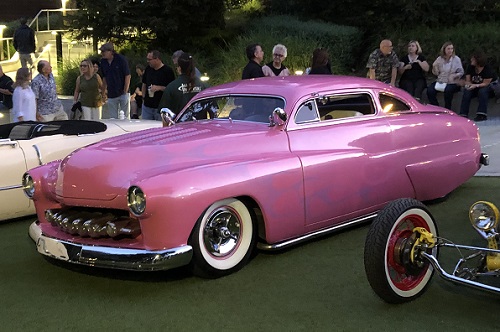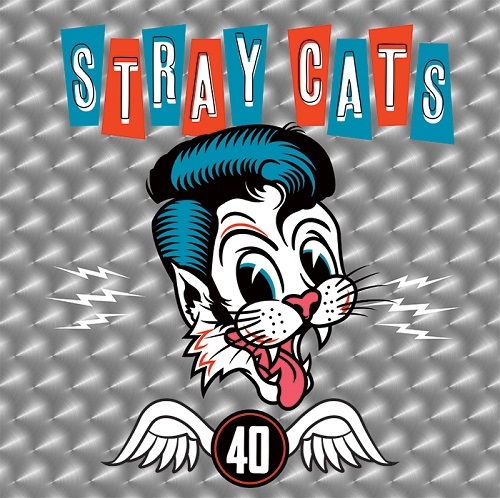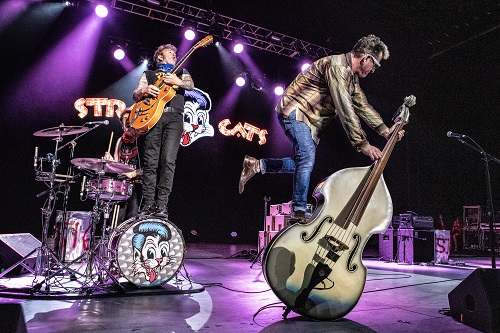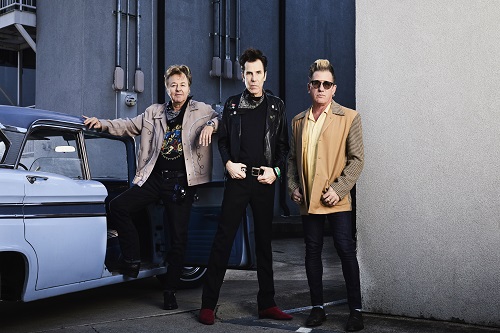Review by Shawn Perry
Live Photos by Suzie Kaplan
I used to know one of these music snobs who thumbed his nose at the Stray Cats, citing a lack of musical sophistication, labeling them derivative and retro, a novelty act, a feeble attempt to raise rockabilly from the dead. Never mind the punky attitude, tattoos and puffed up pompadours. Of course, the Stray Cats — guitarist and vocalist Brian Setzer, bassist Lee Rocker, and drummer Slim Jim Phantom — hit pay dirt with chart-topping singles, a platinum album and heavy rotation on MTV in the early 1980s. They had a solid five-year run before breaking up — the first time.
All three of the Cats have done pretty well on their own. Setzer is regarded as a world-class guitarist with his own Brian Setzer Orchestra that allows him to push beyond his rockabilly roots into blues, jazz, even classical. Rocker and Phantom have made a couple records with David Bowie’s longtime guitarist Earl Slick, and played with numerous different outfits. When it’s time for the Stray Cats to regroup, as they have at various points in their history, the feeling is so right and natural it’s as if they’re picking up from where they left off. To celebrate their 40th anniversary, they released 40, their first full album in 26 years, and scheduled a proper tour with one of its last stops at the Greek Theatre in Los Angeles.

It had been 20 years since the Stray Cats rocked Los Angeles, so it was no surprise that the Greek was a full house with plenty of rockabilly enhancements like classic cars and a live DJ to keep the fans occupied and revved up before showtime. There was certainly no shortage of enthusiasm when Eagles of Death Metal came on and blasted through a vibrant 45-minute set that left the roots rockers anxious for more.
Singer Jesse Hughes was a ball of energy (“I’m the luckiest kid on the block getting to open for the Stray Cats!” he shouted), joined by a revolving door lineup that tonight featured bassist Jenne Vee (also a member of the Slim Jim Phantom Trio), guitarist Dave Catching, and drummer Jorma Vik, plus a rare appearance by the band’s co-founder and leader of Queens of the Stone Age Josh Homme on drums for the most part, and jumping in on guitar at Hughes’ urging.
If you’re not in on the joke — that music of Eagles of Death Metal is hardly “death metal” — the Richard Simmons shields that adorned two of the band’s wall of Orange amps were a clear clue. Whatever you make of it, there’s no denying the boisterous, pulsating attack Hughes and his crew unleashed on songs like “I Only Want You” and “Speaking In Tongues” was just what the Greek needed on a shimmering summer night. There may not have been a more appropriate choice as an opener.

As strains of Eddie Cochran’s “Come Everybody” bled through the house PA, the Stray Cats were welcomed with an uproarious cheer just a little after 9:00. Things got off to a lively start with “Cat Fight (Over A Dog Like Me)” from the 40 album. Over the course of 22 songs, The Stray Cats explored their catalog, playing no less six numbers from the new record, plus another six from 1982’s Built For Speed, the group’s biggest seller long-player, among others.
What’s most striking is that Setzer, Rocker, and Phantom are each masters of their own domain. You can’t get enough of Setzer’s sterling-silver, economical turns when a valley opens up. He rips through each stanza, dropping jaws with a wink and a smile. Phantom, of course, standing behind a small kit, muscles the beat poppin’ without reservation or nonsense. Rocker plays the perfect the counterpart, plucking his standup bass with rigid authority and measured flexibility.

A collective appreciation for the ‘vintage rock’ form they so faithfully imbibe lingers loosely in the air. The Stray Cats openly acknowledged their heroes through song (“Gene And Eddie”), tributes (“Misirlou” for Dick Dale, Dorsey Burnett’s “My One Desire” for Ricky Nelson), and coverage (Gene Vincent’s “Double Talkin’ Baby”). They’ve been able to twist the simple rockabilly idiom into a modern thesis on the redeeming nuance of sound.
The snobs are outnumbered on this one. Armed with a primal instinct and attained maturity, these guys play with a level of finesse, style, and showmanship even their idols couldn’t muster. It’s a classic situation where the student becomes the master. Perhaps Gene Vincent, Eddie Cochran, and every other rockabilly musician from the 1950s owes an equal debt of gratitude to the Stray Cats for keeping their vision alive and thriving for years to come. As the Stray Cats wind up their 40 tour, one can only hope for 40 more.





















